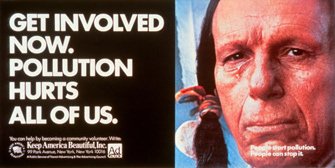oc book review -- Tribe: On Homecoming and Belonging, by Sebastian Junger

#payitforward I hate littering. I mean I literally and viscerally hate it. That classic PSA with the crying Indian, which played for years during the 1970s, got me every time I saw it. Sebastian Junger hates littering too.
“... littering is an exceedingly petty version of claiming a billion-dollar bank bailout or fraudulently claiming disability payments. When you throw trash on the ground, you apparently don't see yourself as truly belonging to the world that you're walking around in.”
I have been writing off and on for years now (in my column, in my previous blog) about the central problem of biology. This is the problem of competition vs. cooperation. Chemicals don't have to worry so much about this problem, because aside from maybe having an extra neutron, all atoms of the same element, and all molecules of the same compound, are interchangeable.
Chemicals don't compete. Biological things do.
Cells compete, both individually and as components of bodies. Bodies compete, both individually and as components of societies. And on up the scale of social organization. Because competition and cooperation are unavoidably on opposite sides of the same social interaction coin, betrayal is the thing that pisses us off the most. Betrayal is what yesterday's Snowden piece was really about. Who is the traitor? Snowden, for telling us what his NSA masters were up to? Or the NSA, for lying to us about archiving all our private data? Well, if think about society as a series of concentric circles, the answer is obviously both. He betrayed them to us. As part of us, I'm pretty happy about that. And I can see why they would be so mad about it. Of course, if it were possible for us to see nobody as them and everybody as us, then all our problems would dissolve, right? That's what the Buddha said (Jesus, too, maybe). Unfortunately, evolution didn't build us that way.
Competition is inescapable, right?
Sebastian Junger's main concern in his book Tribe is with veterans, men and women who have put their lives at risk for our benefit, and who are collectively shit on by us. But Tribe is not just a polemic, like I would expect from Chris Hedges (who I'll return to in a bit). Tribe is a science book. In fact, it's the best kind of science book, one that is deeply informed by research, but which pulls its examples from history, and from the headlines, and from rich and vivid personal experience.
The first question Junger engages is historical: why would American colonists run off to join the Indians, when almost none of them defected to the much richer and more powerful colonies? Many of the Founding Fathers, including Benjamin Franklin, wrestled with this question. The book White Trash has some of the answers, namely that our society treats poor people very badly, and has from the very beginning (but that's for another review). For Junger it's all about how the natives treated people inside their own tribe -- namely, with radical equality. He does not shy away from the fact that during warfare they engaged in really hideous forms of torture against other tribes, including white settlers (watch the movie Black Robe if you don't know what I'm talking about). The point is that inside the tribe was different from outside the tribe. This insider-outsider psychology is the legacy of millions of years as small-troop social primates, a way of enhancing and enforcing cooperation inside the tribe, and something that any member of the AEPS Facebook group would be familiar with.
Then Junger goes off into war, and soldiers, both of which he has a good deal of experience with, as examples of magnificently unselfish heroism. But, importantly, he doesn't stop there. He doesn't pathologize war as uniquely awful, as my favorite hit man Martin Blank does.
“Pilots carpet-bomb cities! That's indiscriminate! I don't do that!”
We all live in a violent world, and war is only one example of catastrophe. Hurricanes and tsunamis drown coastal communities (the 2004 Boxing Day tsunami killed almost 100 times as many people as 9/11). People are buried in coal mines and landslides. Rampage killers, which Junger compares to the Navajo skinwalker legends, shoot other children in their own schools. Each of these actions creates equal and opposite acts of heroism, either the showy risk-your-life “male” version or community-building “female” version. Even economic collapses like the Great Depression and our own 2008 financial meltdown can trigger milder versions of the small-town neighbor mentality. The guy who owns our local Chik-Fil-A franchise was so affected by the Orlando nightclub shooting that he drove down there to hand out sandwiches and water to the grieving sodomites and their families.
Minister and Truthdig columnist Chris Hedges wrote a fine book about his own experiences as a war correspondent called War Is a Force that Gives Us Meaning (summarized in this video). He described the addictive adrenaline high and the depression that follows it upon returning to the dim, grey, everyday world. But I think Sebastian Junger's much shorter Tribe is the bigger piece of work, one that generalizes beyond war to suffering, in the Buddhist sense of shared suffering as the thing that triggers empathy.
Randall Hayes is a big baby. The worst thing that ever happened to him personally was trying to sleep in his Houston apartment during the botched evacuation for Hurricane Rita, during which his wife called every two hours from Montana to ask, “Are you dead yet?”